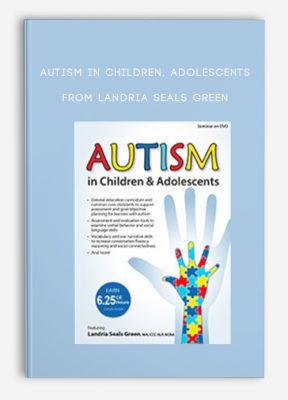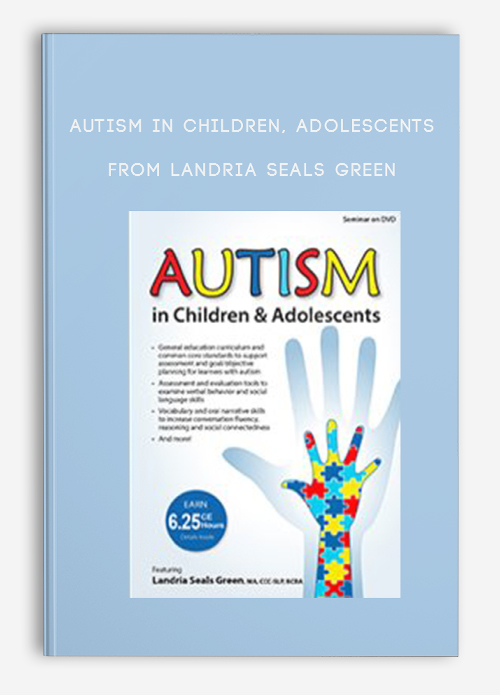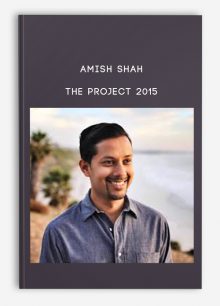Autism in Children, Adolescents from Landria Seals Green
$109.00 $32.00

Autism in Children, Adolescents Advancing Language for Conversation Fluency and Social Connections from Landria Seals Green
Faculty:Landria Seals Green
Duration:6 Hours 11 Minutes | Format:Audio and Video
Archive : Autism in Children, Adolescents from Landria Seals Green
Get Autism in Children, Adolescents from Landria Seals Green on Salaedu.com
Outline:
ASSESSMENT FOR LANGUAGE, SOCIAL BEHAVIOR AND CONVERSATION FLUENCY
- Beyond the traditional speech-language assessment
- Primary tool for conversation, organization, expressive language and reasoning skills
- General education standards and Common Core Standards
- Integrate results for a comprehensive treatment plan
DESIGNING GOALS FOR LANGUAGE, SOCIAL BEHAVIOR AND CONVERSATION FLUENCY
- Measurable goals and objectives for:
- Behavior and social intervention
- Language and fluency of skills
- Treatment plans and IEPs to support collaborative responsibility
- Proactively plan to teach skills across all settings
- When to design and plan for generalization
STRATEGIES TO DEVELOP EXPRESSIVE LANGUAGE
- Align verbal behavior and traditional language therapy
- Declarative language skills and synonym usage for social and academic vocabulary
- Progress from single word utterances to multi-word word utterances
- Connect academic language learning and classroom participation
- Data collection strategies for expressive language intervention
STRATEGIES TO STRENGTHEN ORAL NARRATIVE SKILLS
- Improve narrative forms including story recall
- Incorporate opinions and perspectives into oral narratives
- Integrate body language and tone of voice in narrative presentation
- Add descriptive language to narrative skills
- Data collection in oral narrative skills improvement
STRATEGIES TO SUPPORT LANGUAGE AND REASONING
- Teach learners how to reason and make connections with vocabulary
- Connect receptive vocabulary and expressive language output
- Problem solving and reasoning skills for academic language
SOCIAL COGNITION STRATEGIES
- Conversation colors to support perspective taking
- Build “flexibility” in teaching sessions
- Problem-solving beyond finding one solution
- Perspective taking to support classroom behavior and relationships
- Problem solving and reasoning for social safety
- Data collection for social cognition
SOCIAL BEHAVIOR STRATEGIES
- Proactive strategies to support social behavior
- Social concept stories to explain “why” and “how”
- Incorporate social perspective taking into behavior contracts and token systems
- Data collection to provide reinforcement of improved social behavior
CONVERSATION FLUENCY STRATEGIES
- Connect expressive language to conversation fluency
- Verbal fluency under social timed pressure
- Conversation fluency to support generalization
- Coaching, shadowing, modeling in education and community environments
- Rhythm and music to support conversation fluency
- Data collection to track learner’s conversation fluency
Get Autism in Children, Adolescents from Landria Seals Green on Salaedu.com
Description:
- Effective assessment tool selection for social skills and language deficits
- Make meaningful connections through problem-solving, reasoning, perspective taking, social behavior, and conversation fluency
- Strategies to teach academic language for inclusion success
- Data collection methods for social skills, social behavior, and conversation fluency
Children with autism often need support in reaching advanced language levels and expectations found in the classroom, community, and in social relationships. This need is a requirement to reaching increased levels of independence. This seminar focuses on going beyond early language programming and moving toward advancing language skills and social connections for learners with autism.
Join autism expert, Landria Seals Green, MA, CCC-SLP, BCBA, and learn evidence-based strategies for accurate assessment tool selection, developing effective learning programs, and improving data collection methods for social skills, social behavior and conversation fluency. Through the use of case studies and hands on activities, you will walk away with the skills necessary to:
- Select assessment tools that accurately evaluate social skills and language deficits
- Advance vocabulary, oral narrative skills and conversation fluency
- Advance language skills of sentence complexity, reasoning and social problem-solving
- Incorporate methods of applied behavior analysis across the therapy team to support learner language advancement
- Create activities and tools that engage student learning and support self-management and regulation needed for inclusion
When therapy teams move toward specifically teaching, shaping, and supporting the generalization of social behavior, conversation fluency, verbal fluency and reasoning—the learner with autism can reach new heights in the academic setting, in relationships and vocationally!
1 review for Autism in Children, Adolescents from Landria Seals Green
Add a review Cancel reply
Related products
HEALTH - FITNESS - LIFESTYLE - MEDICAL
HEALTH - FITNESS - LIFESTYLE - MEDICAL
HEALTH - FITNESS - LIFESTYLE - MEDICAL
HEALTH - FITNESS - LIFESTYLE - MEDICAL
Complete Certified Professional Coach Online Course from Berry Fowler
HEALTH - FITNESS - LIFESTYLE - MEDICAL
HEALTH - FITNESS - LIFESTYLE - MEDICAL
HEALTH - FITNESS - LIFESTYLE - MEDICAL










king –
“Landria was a good presenter. I liked how she used “comedy” to engage the audience and keep us motivated and interested in the content. She is knowledgeable and had me look at things from a different perspective. Thank you.”